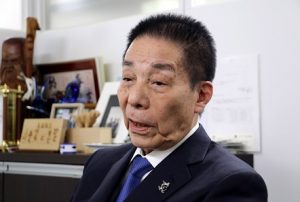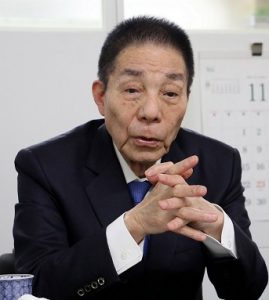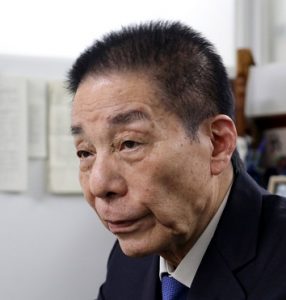Hiroshima Voices: “No Nukes, No War” Makoto Koga, 82, former secretary-general, Liberal Democratic Party, Miyama City, Fukuoka Prefecture
Dec. 8, 2022
Politics exists to achieve peace
Mr. Koga has assumed many positions in the world of politics, including as secretary-general of the Liberal Democratic Party (LDP). Mr. Koga also served for more than six years as chair of Kochikai, a traditionalist faction of the LDP with a platform of “economic diplomacy, lightly armed.” He passed the leadership baton of Kochikai to the current Prime Minister Fumio Kishida, who was elected from Hiroshima Prefecture. Based on his experience at age four of having lost his father in the Philippines, one of the battlegrounds in the Pacific theater of World War II, he positioned “peace” as a pillar of his political stance. He consistently voted “no” on decisions that “might lead to war.” As an example, he walked out of Japan’s parliament prior to a vote on legislation concerning special measures on humanitarian and reconstruction assistance for Iraq in 2003 that allowed deployment of Japan’s Self-Defense Forces personnel to Iraq.
Click here to view the video
The tragedy of war continues with Russia’s invasion of Ukraine. The use of nuclear weapons as a tactic of war is a realistic possibility. Nevertheless, if by any chance a war with nuclear weapons were ever to break out, nobody would win or lose. The world itself would end. In my opinion, the responsibility of all of us who are alive in this moment is to make every effort to prevent such a situation from happening.
A nuclear weapon for a nuclear weapon. That sort of argument, gaining momentum in the world today, is unforgivable. Japan is the first and only A-bombed nation in the world to have experienced the horror of nuclear weapons. We have a duty to convey to the world the terror and senselessness of such weapons.
Imagine the blood and tears shed during the Pacific theater of World War II. As chair of the Japan War-Bereaved Families Association, I have experienced the sorrow of bereaved families that have lost loved ones. Prime Minister Fumio Kishida, who carries on his back as his constituency the A-bombed Hiroshima, has said he will “fundamentally boost” the nation’s defense capabilities to protect Japan’s citizens. However, if one country tries to build up its arms and military capacity, another country makes an effort to go even further. Such actions only lead to an interminable arms race that is hard to effectively halt by deterrence.
North Korea has launched missiles; Russia has invaded Ukraine. Even amid such a reality, politics exists to achieve the ideal of peace. I hope Japan’s prime minister can convince the public of that notion.
Article 9 of Japan’s constitution was born of the country’s self-examination regarding its actions in the last world war. To maintain the peace, Japan’s post-war diplomacy has struck a balance between two core principles—Article 9 of the constitution and the U.S.-Japan Security Treaty. That precisely describes the duo-centric “Oval Theory” advocated by the late Masayoshi Ohira, former prime minister of Japan. Now is the time to remember and appreciate this idea. (Interviewed by Koji Higuchi)










